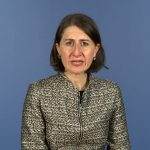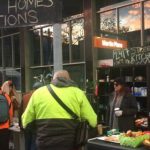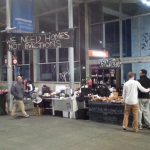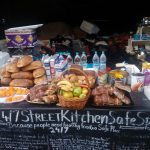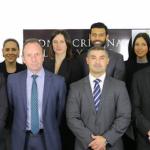Martin Place Rough Sleepers Agree to Move, But There’s Nowhere to Go
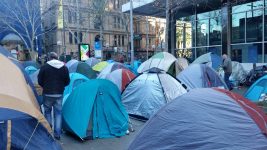
It seems the City of Sydney has had a change of heart in regards to the Martin Place homeless camp.
Rather than trying to move them on, Sydney lord mayor Clover Moore announced on Monday evening that she’d negotiated a solution to accommodate the rough sleepers elsewhere.
The announcement followed demands made by NSW premier Gladys Berejiklian and NSW social housing minister Pru Goward, calling on the city council to move the camp on. The mayor refused stating in a letter that what was needed was “the provision of permanent housing with appropriate support.”
During the press conference, Ms Moore said a permanent safe space will be set up for the Martin Place community. The City of Sydney council and the Department of Family and Community Services are both going to put up $100,000 each to establish the facility.
The facility would provide food, showers and laundry services, as well as providing links to homelessness services. “In the meantime, a communal safe space will be found that could be in one of our facilities,” Ms Moore told reporters. “Somewhere where they can go immediately.”
Moving. But where?
It was said council trucks could have been expected at the Martin Place camp on the eastern side of the pedestrian mall as early as 7 am Tuesday morning to start dismantling the tents. However, by midday nothing had taken place, and the tents remained.
After the mayor’s announcement on Monday night, it came to light during a council meeting that the location of the immediate temporary accommodation site was still unknown, and the camp might remain for some time.
“We came to an agreement to progressively dismantle as we didn’t need gear anymore,” Lanz Priestley, co-founder of the safe space, told Sydney Criminal Lawyers®. “Now they haven’t actually come up with a place for us to move to.”
There was also some confusion as to whether the temporary site would allow people to sleep there. But Mr Priestley said he’d spoken to the mayor directly on Tuesday morning and the council conceded that people could sleep at the site on a temporary basis. “Whatever that means,” he added.
Safety in numbers
Sydney’s 24-7 Street Kitchen and Safe Space was established in Martin Place back in mid-December. The street kitchen has been providing meals to the city’s needy, and the safe space provides a haven for those forced to sleep out on the streets.
Initially, it was situated underneath some construction hoardings on the side of 60 Martin Place. However, in mid-June, the council evicted the community, and sent in workers to board up their shelter.
From that point on the setup morphed into a burgeoning tent city out the front of the Reserve Bank building. Today, it consists of around 40 tents that serve as shelter for around 55 people who find themselves in a state of homelessness.
Mr Priestley said the operation was initially established after he’d been told by several homeless women that they’d woken up on the street at night with men trying to sexually assault them. The safe space was rolled out so those forced to sleep on the street can do so together with security.
Last week things came to a head, when NSW premier Gladys Berejiklian said that the rough sleepers make her feel “completely uncomfortable,” and she wanted them moved on. On Sunday, she accused Ms Moore of playing “political games” for failing to remove the homeless people.
The premier further warned that if the City of Sydney council failed to do something soon the state government would intervene.
Minister Goward told the ABC last week that Housing NSW had been at the site 42 times, and they made countless offers of temporary accommodation and 60 offers of permanent.
At the time of the council raid in June, a number of rough sleepers were offered permanent accommodation and received it.
However, what’s being offered now is temporary accommodation, which is often dangerous and inadequate. And after a number of days an individual can find themselves out on the street alone again. Whereas, at the safe space they’re part of a community.
An uncertain future
According to Mr Priestley, he’s heard from some “quiet reliable media people” that the state government were holding a Cabinet meeting on Tuesday afternoon with the intention to shut the safe space down. This is despite Ms Moore’s announced plans that involve the state government.
At the 24-7 Street Kitchen and Safe Space there is an uneasy feeling, as residents don’t know whether the council are about to provide them with temporary accommodation leading onto permanent, or whether the police could move in and forcibly remove them.
NSW police commissioner Mick Fuller told 2GB last week that the “problem” could be solved if council workers went in and removed the rough sleepers’ equipment. “If one person puts a step out of line, I’ll throw them in the back of the truck,” Mr Fuller warned.
Spiralling out of control
This week marks Homelessness Week, which raises awareness of the ever-increasing number of homelessness people in Australia. The latest City of Sydney street count in February this year found there were 948 homeless people in the city alone, representing a 28 percent increase since 2011.
This city has been deemed the second most unaffordable city in the world and as property prices soar, less people can afford accommodation. And the lack of social housing compounds the issue. In NSW, there’s over 60,000 people on the social housing waiting list state-wide.
RMIT homelessness professor Guy Johnson has explained that the people who are sleeping out on the streets are only the visible side of the homelessness crisis. He estimates that rough sleepers account for only a fifth of the overall homeless population in the country.
A long-term solution from both levels
Mr Priestley welcomes the deal that the mayor has brokered. He said that the position of the council is much better, than the stance the Berejiklian government is currently taking.
But he believes that if both levels of government worked together then they could solve this issue, especially as the state has a $12 billion surplus at present.
“There’s been no consultation on the way forward with the state government at all,” Priestley concluded. “At least we’ve now got a consultative process going with the council.”


